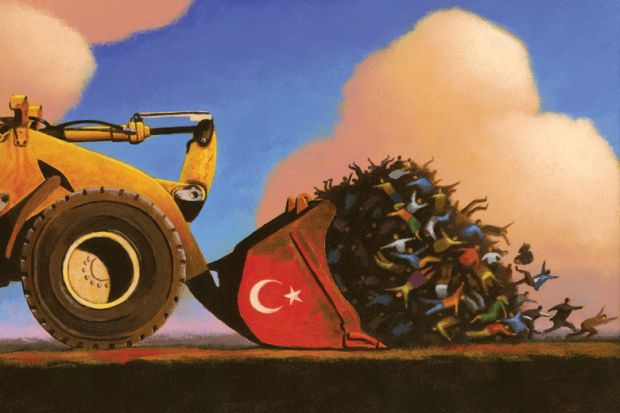The major casualty of the restoration after the botched coup in Turkey has been the education system in general and higher education in particular.
So far, all faculty deans (1,577 in total) have been forced to resign; 15,200 education ministry officials have lost their jobs; the licences of 21,000 private-school teachers have been revoked; and a travel ban of unspecified duration has been imposed on all academics. Article 5 of the first decree issued under the state of emergency is likely to result in the revocation of the passports of the 1,128 academics who signed the open letter of Academics for Peace in January, condemning state violence in the Kurdish region. Also under this decree, 15 universities suspected of close ties with the Gulen Islamic Movement – blamed by the government for the coup attempt – have been shut down, with explicit provision that the list may be extended if necessary.
At the time of writing, a large number of organisations and more than 8,000 signatories to a petition have rightly condemned the attempted military coup and called on Turkish officials to respect academic freedoms. In an encouraging act of solidarity, Masaryk University in the Czech Republic, together with the European University Association and the Czech Rectors Conference, is seeking ways of helping those affected by the purge. The common theme in all these statements and initiatives is an emphasis on freedom of expression, due process and free movement of researchers.
This consensus indicates clearly that the international academic community is more sensitive to the curtailment of freedoms than national governments, whose reactions to the authoritarianism of the Turkish AKP government under Recep Tayyip Erdoğan have verged on appeasement both before and after the attempted coup. A principled and consistent voice of solidarity is needed from academics, not only to limit damage to higher education in Turkey but also to remind our own governments that their stance on this issue is on our radar.
Yet the threat to the integrity and quality of higher education in Turkey is neither new nor limited to the current wave of repression. As I set out in an earlier article in Times Higher Education (“Academic freedom under threat in Turkey”, 14 April), the higher education sector has always suffered from state tutelage. In both constitutional provisions and sector-specific legislation, higher education is charged with the duty of championing a monolithic “Turkish State” that leaves no room for ethnic or linguistic minorities. Only a few universities and academics have dared to challenge this state-centric orthodoxy.
Thus, this current cull should be seen in a wider context, where higher education is always subject to blatant state intervention. This includes successive AKP governments, which have been designing a post-Kemalist higher education system in alliance with the Gulen movement. Their common project has involved supply-side measures such as opening new private universities funded by Islamic capital, diverting research funding to individuals or institutions deemed to be politically compliant and granting easier access to “status goods” to supporters while persecuting critics. They also reshaped the curriculum for primary and secondary education, and encouraged the proliferation of private institutions specialising in preparation for university entrance exams. The aim was to mould expectations and increase demand for a higher education system in which Islamic values and loyalty to state authority are the norm.
Now that the partnership with the Gulen movement is over, the AKP government can be expected to use the state of emergency ruthlessly to redesign the whole education system in its own image. The lack of due process, as seen in dismissals based on lists prepared by intelligence agencies or informers and opaque processes of recruitment into vacant posts, is a major concern. There is also anxiety about a possible second wave of purges targeting all critics of the regime. (This is a serious risk because the government is pushing ahead with a judicial and administrative witch-hunt against Academics for Peace, which it accuses of supporting terrorism.) A third concern is the creation of a climate of fear that will force critics of the regime either to resign or toe the line, even if they escape outright dismissal.
Overall, I expect the clouds over higher education in Turkey to grow even darker. For years to come, the country will experience a serious decline in the quality of its research output (which is already in need of improvement), the diversity of its academic staff and the critical skills of its graduates. Although I agree with the principle of free international academic cooperation, I would still want to differentiate between academics or institutions that have collaborated with the regime and those who have opposed it. And I don’t expect Western governments to exert pressure on the Turkish government unless the international academic community continuously intervenes in favour of academic freedom and the rule of law.
Mehmet Ugur is professor of economics and institutions and a member of the Greenwich Political Economy Research Centre at the University of Greenwich.
POSTSCRIPT:
Print headline: Post-putsch purge is furthering state’s aim of a subservient sector
Register to continue
Why register?
- Registration is free and only takes a moment
- Once registered, you can read 3 articles a month
- Sign up for our newsletter
Subscribe
Or subscribe for unlimited access to:
- Unlimited access to news, views, insights & reviews
- Digital editions
- Digital access to THE’s university and college rankings analysis
Already registered or a current subscriber?





